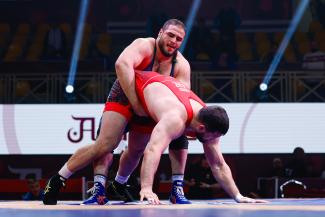UTS Launches Official Logo for Virtual Youth Festival 2020
Tuesday, September 22, 2020 - 11:24 By United World Wrestling Press

CORSIER-SUR-VEVEY (September 22) -- United World Wrestling partner United Through Sports (UTS) has launched the official logo for the first edition of the UTS Virtual Youth Festival 2020.
According to the UTS release, the logo stands to "represent unity in diversity through the inclusion of all youth regardless of ability."
The design uses a vibrant, bold and youthful color palette appealing to the younger generations signifying fun and positivity. The festival logo is built upon the foundations of the UTS official logo and adapted towards the novel virtual festival concept.
The centre of the logo symbolises the digital world with four different youth encircling the globe. They are connected across the world sharing the same experience, the same event at the same time. The font was chosen to give an urban, brushstroke and down-to-earth approach to demonstrate the feeling of movement and creativity.
This festival encourages youth to showcase their unique talents and creativity, offering them a chance to shine bright during a difficult time. Over 60 organizations and federations have joined to participate and/or contribute towards this unique event which has been patronized by the International Olympic Committee, the International Paralympic Committee, Special Olympics, Sportaccord and GAISF.
UTS aims to focus on promoting more inclusion through sport, to encourage a change in perspective and create more opportunities for youth with different abilities.
UTS's Virtual Youth Festival will be the first of its kind with a charge promote unity through sport.
UTS/AIMS President, Stephan Fox, said: “Now is the time to unite towards a better world. Many children around the world will remain in quarantine after the pandemic ends and we need to find sustainable solutions to reach them, to give them opportunities and to include them.”
We all feel the impact the pandemic has had on the international sport community, he said: “No child should be forgotten or left behind and now we have a unique chance to motivate the youth and keep them engaged in sports towards their physical health and wellness.”
“The festival will give the youth joy through the digital ecosystem. With an increase of mental health issues in many parts of the world during the COVID-19 pandemic, we all need to remember the youth are also facing many challenges during this crisis.”


Share your thoughts.
Comments